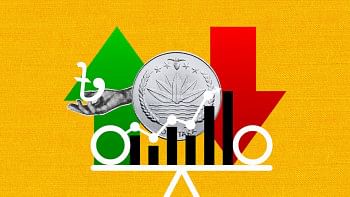Go on with policy support to fight second wave: IMF

Bangladesh faces challenges in sustaining the effective response it unveiled in the initial phase of the pandemic last year as it grapples with a devastating second wave of the deadly pathogen, the International Monetary Fund has said.
"Bangladesh is in the throes of another wave of the pandemic, and this is presenting challenges and downside risks to growth," said Jonathan D Ostry, deputy director for the Asia and Pacific Department of the IMF, at a virtual press briefing recently.
The multilateral lender had organised the press conference on the economic situation of the Asia-Pacific region as part of its Spring Meetings.
When asked about the types of fiscal measures the government needs to take to address the pandemic-induced economic downturn, Ostry said that the challenge for policy was to sustain the effective response that Bangladesh made during the initial phase of the crisis.
"The government will have to continue its support to the vulnerable groups through social safety nets and its support for the agriculture sector. So, this is the challenge," he said.
Since Covid-19 hit Bangladesh on March 8 last year, the government has announced 23 stimulus packages involving Tk 124,053 crore, which is more than 4 per cent of the country's gross domestic product.
Although key contributors to the economy such as small and medium enterprises, farmers and lower-income professionals have gone through their worst-ever crisis because of the first wave of the coronavirus, the implementation rates of the stimulus packages dedicated to them are not satisfactory.
As of March 18 this year, banks disbursed about Tk 13,011 crore among 89,892 borrowers under the stimulus package worth Tk 20,000 crore earmarked for the SME sector, data from the central bank showed.
Despite extending the deadline thrice by the central bank, many banks showed unwillingness to disburse loans to the SME sector, which is considered the bedrock of the economy.
The Bangladesh Bank has recently asked banks to disburse the fund by June.
Banks have disbursed 72 per cent of the stimulus package for the farm sector, which received Tk 5,000 crore.
Like the SME stimulus package, the BB was also forced to push back the deadline of the scheme due to the lukewarm response from banks. It directed lenders to disburse the targeted fund under the package by June.
The implementation rate is also feeble when it comes to Tk 3,000 crore scheme for low-income professionals, small businesses, and marginal farmers. Banks disbursed 52 per cent of the fund through microfinance institutions as of March.
But the picture is quite different for the stimulus fund introduced for the large borrowers: banks lent 95 per cent of the fund, amounting to Tk 33,000 crore.
The BB also expanded the fund to Tk 40,000 crore to provide loans to the large businesses located at economic and export processing zones.
"Going forward, there is always the need to strengthen the fiscal revenue capacity of the economy to support expenditures," Ostry said.
Working with development partners will also help fiscal cushioning, he said.
Earlier, the IMF said despite the recent spike in Covid-19 infections, South Asia, excluding India, was recovering, led by Bangladesh.
The higher-than-expected exports and remittances are playing a positive role in boosting the growth, it said.
The lender revised its GDP projection for Bangladesh upwards to 5 per cent in 2021, up from October's projection of 4.4 per cent.
The economy is expected to grow 7.5 per cent in the next year, it said.

 For all latest news, follow The Daily Star's Google News channel.
For all latest news, follow The Daily Star's Google News channel. 



Comments